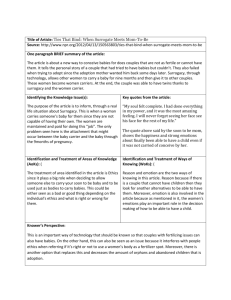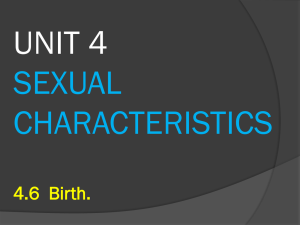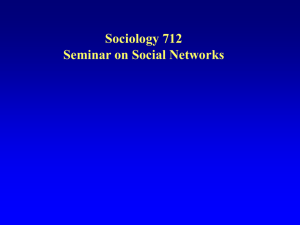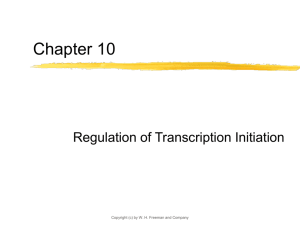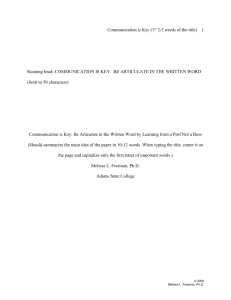Essay 11
advertisement
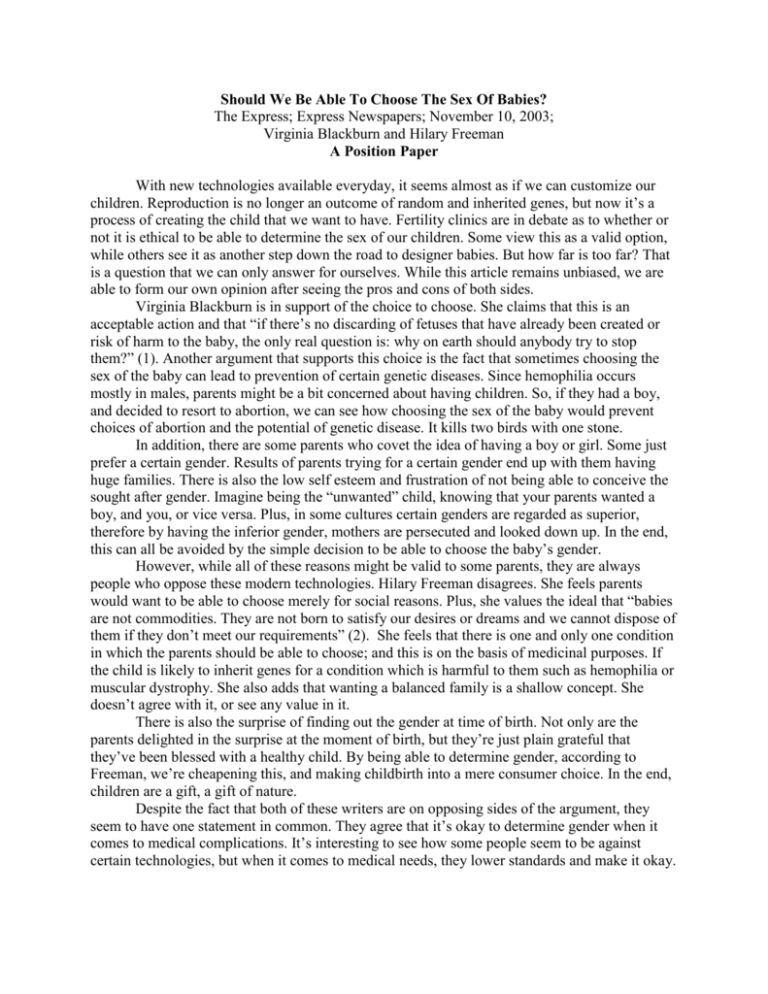
Should We Be Able To Choose The Sex Of Babies? The Express; Express Newspapers; November 10, 2003; Virginia Blackburn and Hilary Freeman A Position Paper With new technologies available everyday, it seems almost as if we can customize our children. Reproduction is no longer an outcome of random and inherited genes, but now it’s a process of creating the child that we want to have. Fertility clinics are in debate as to whether or not it is ethical to be able to determine the sex of our children. Some view this as a valid option, while others see it as another step down the road to designer babies. But how far is too far? That is a question that we can only answer for ourselves. While this article remains unbiased, we are able to form our own opinion after seeing the pros and cons of both sides. Virginia Blackburn is in support of the choice to choose. She claims that this is an acceptable action and that “if there’s no discarding of fetuses that have already been created or risk of harm to the baby, the only real question is: why on earth should anybody try to stop them?” (1). Another argument that supports this choice is the fact that sometimes choosing the sex of the baby can lead to prevention of certain genetic diseases. Since hemophilia occurs mostly in males, parents might be a bit concerned about having children. So, if they had a boy, and decided to resort to abortion, we can see how choosing the sex of the baby would prevent choices of abortion and the potential of genetic disease. It kills two birds with one stone. In addition, there are some parents who covet the idea of having a boy or girl. Some just prefer a certain gender. Results of parents trying for a certain gender end up with them having huge families. There is also the low self esteem and frustration of not being able to conceive the sought after gender. Imagine being the “unwanted” child, knowing that your parents wanted a boy, and you, or vice versa. Plus, in some cultures certain genders are regarded as superior, therefore by having the inferior gender, mothers are persecuted and looked down up. In the end, this can all be avoided by the simple decision to be able to choose the baby’s gender. However, while all of these reasons might be valid to some parents, they are always people who oppose these modern technologies. Hilary Freeman disagrees. She feels parents would want to be able to choose merely for social reasons. Plus, she values the ideal that “babies are not commodities. They are not born to satisfy our desires or dreams and we cannot dispose of them if they don’t meet our requirements” (2). She feels that there is one and only one condition in which the parents should be able to choose; and this is on the basis of medicinal purposes. If the child is likely to inherit genes for a condition which is harmful to them such as hemophilia or muscular dystrophy. She also adds that wanting a balanced family is a shallow concept. She doesn’t agree with it, or see any value in it. There is also the surprise of finding out the gender at time of birth. Not only are the parents delighted in the surprise at the moment of birth, but they’re just plain grateful that they’ve been blessed with a healthy child. By being able to determine gender, according to Freeman, we’re cheapening this, and making childbirth into a mere consumer choice. In the end, children are a gift, a gift of nature. Despite the fact that both of these writers are on opposing sides of the argument, they seem to have one statement in common. They agree that it’s okay to determine gender when it comes to medical complications. It’s interesting to see how some people seem to be against certain technologies, but when it comes to medical needs, they lower standards and make it okay. After looking thoroughly at both sides of this issue, I have determined that I mostly agree with Freeman, but I think that it’s still wrong in the case of medical complications. In addition, my reasons are a bit different. I feel that by choosing the sex of our babies, that we’re “playing God”, and frankly, I think that that is something that we should avoid. It’s not our role. People may call it cruel because it wouldn’t be taking the needed steps toward avoiding and curing certain diseases. But when we go through challenges like that, it makes us better. We become better people, and there is justification for why things like that happen. I feel that it’s truly best to just stay out of it. In the Bible, David the psalmist says in Psalm 139: 13-16, “For you created me in my inmost being, you kit me together in my mother’s womb. I praise you because I am fearfully and wonderfully made; your works are wonderful, I know that full well. My frame was not hidden from you when I was made in the secret place. When I was woven together in the depths of the earth, your eyes say my unformed body. All the days ordained for me were written in your book before one of them came to be.” God’s character goes into every person that he creates and there is no reason for us to be dissatisfied with that.




